The Mistress And The Maid: Mildred Pierce
Published on March 30th, 2011 in: Back Off Man I'm A Feminist, Books, Culture Shock, Feminism, Issues, Movies, Teh Sex, TV |By Less Lee Moore
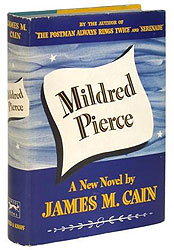
When I learned of the Mildred Pierce miniseries—directed by Todd Haynes and airing on HBO—I was thrilled. I’ve been a longtime fan of the novel and film, as well as of Haynes. Then I started to second-guess my excitement.
Would another male-directed version of this story merely intensify the story’s “male gaze”? Furthermore, should I revere Mildred Pierce as a feminist text when the original novel was written by one man (James M. Cain) and first captured on screen by another (Michael Curtiz)?
The novel, like all of Cain’s work, is the kind that proves difficult to condense into a couple of hours. Mildred’s inner monologue—to Cain’s credit, the story is told from her perspective—is non-existent in the film, save for its basic structure: we see flashbacks of the events as Mildred conveys them to a police detective.
This narrative structure, like the style of the film itself, is pure noir: chiaroscuro, crimes of passion, and a femme fatale. This befits the time period (1945) and the casting of Joan Crawford as Mildred, but reduces the original work, which starts in 1931 and ends almost a decade later (the novel was published in 1941).
Good writers have a way of making readers realize things about the characters that they don’t—or won’t—consciously admit. Cain presents Mildred as she sees herself, but further examination reveals deeper truths of which we become aware long before she does.
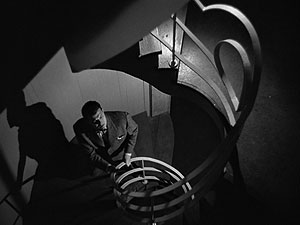
We are introduced to Mildred Pierce as an angry housewife who kicks her husband Bert out of the house because he won’t look for a job, preferring instead to spend his time “flopping down” with neighbor Mrs. Biederhof. Mildred, as described by Cain in the novel, looks nothing like Crawford, but her casting creates visual shorthand. What Crawford’s Mildred lacks in consistency (she bursts into tears after Burt leaves) she makes up for in physicality; sharp, heavy eyebrows, severe dark hairstyle, angry pout. One cannot help but consider, however metacritcally, Crawford’s status as not only a tough dame, but also a notorious Hollywood bitch, a gay icon, and of course, her infamous characterization in Mommie Dearest (book and film).
Having been married for eleven years, Mildred seems to have forgotten about her feminine charms, except for her legs, of which she is quite proud. Her sexual exploits in the novel were probably considered somewhat risqué at the time of publication, but four years did not usher in a revolution; the film came out when the Hays Production Code, established in 1930, was still a huge influence on not only which films were made, but how.
As a result, much of Mildred’s most sexually liberated actions are either eliminated from the film or changed drastically. In the book, she embarks on a sexual relationship with her husband’s former co-worker Wally; in the film, she rebuffs him. In the book, she hits on a man at work (society playboy Monty Beragon) and spends the night with him—both literally and figuratively—at his beach house. In the book, he hits on her and she only spends an afternoon at the beach house. The fact that she got pregnant with her eldest daughter Veda before she was married is also removed from the film adaptation.
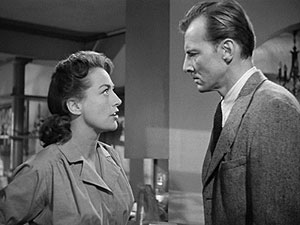
Despite her confidence in dumping Bert, Mildred wonders how she will provide for herself and her two daughters in his absence. Her neighbor Lucy tries to help by reintroducing Mildred to the power of sex, convincing her to cook a meal for Wally instead of letting him take her out to dinner:
“[H]e’s all paid up because he bought your dinner, and that makes it square . . . [y]ou play it right and inside of a week, your financial situation will be greatly eased . . . ”
Mildred balks: “You think I want to be kept?” she asks. “Yes,” replies Lucy. Perhaps this dialogue could have made it into the film in 1931, but not 1945. From a feminist perspective, it could be viewed as outright sexism. Cain sidesteps this by having the idea come from Lucy, not Mildred, thus slightly removing her burden of guilt.
Eleven years of cooking, cleaning, and child rearing doesn’t make for a compelling resume; Mildred cannot find a job she considers suitable. This kind of snobbery is at once pathetic (beggars cannot be choosers) and completely sympathetic (waitressing is a thankless, low-paying job). Then Mildred is confronted by the titular head of Alice Brooks Turner employment agency.
Miss Turner makes no attempt to hide her disgust at Mildred’s predicament, branding receptionists as “lazy dames,” implying that they’re sluts, and calling Mildred a “nitwit” in one practically uninterrupted character assassination, ending with the stinger, “you’ve let half your life slip by without learning anything but sleeping, cooking, and setting the table, and that’s all you’re good for.” On the one hand, she evokes the second wave feminist idea that housework is oppressive, but on the other, she disparages other women’s life choices.
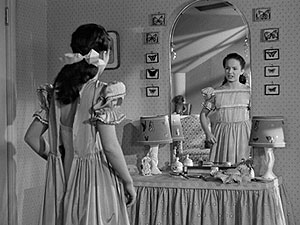
One wishes that this scene (or for that matter, Mildred’s long and arduous job search) had found its way into the Curtiz film, yet the time period was on his side. By 1945, the Rosie the Riveter era had, at least temporarily, changed the public’s mind about women in the workforce. Mildred asking for, and then getting offered, a job as a waitress through her own initiative, was not lost on audiences then or now. Although the film shortens Mildred’s rise to success with her own restaurant chain from the novel’s nine years, the effect is the same. Her business acumen and acquisition of wealth, while commendable from a feminist perspective, still fail to endear her to her eldest daughter Veda.
Despite Crawford’s casting, it is Veda who is portrayed in the film as the femme fatale, the bad seed. She fulfills the same role in the novel, but in that case it’s a seed that Mildred, however unwittingly, has planted herself. There it is immediately apparent to the reader that Veda is a Monster; Cain had a remarkable skill in conveying slang as well as snobbery. She is obsessed with money, privilege, and power, and clearly angered by the fact that Mildred has not provided them. While Ann Blyth successfully portrays Veda as a snotty minx in the film, it is Bert who notices these traits before Mildred does, trying unsuccessfully to point it out to her several times. Then, there is Moire (shortened to Ray, and in the film changed to Kay), the younger Pierce daughter, who is cheerful, sweet, and guileless.
Slasher movies in future decades would kill off sexually active teens in gruesome ways, but here it is Mildred who is punished for casual sex by having Ray succumb to the flu while she is spending the night with Monty; thus Ray pays for her mother’s spontaneous actions with her own life. The film glosses over Mildred’s sexually forward behavior by having Mildred meet Monty when she purchases the restaurant from him and only going to the beach house after Monty persists. This means that Mildred still owes a kind of debt to Monty, but the results are the same: Ray’s death and her guilt.
This could be seen as another of Cain’s damnations of female sexuality, but its purpose is more sinister, as it paves the way for Mildred’s eventual doom: she describes “a guilty, leaping joy that it had been the other child who was taken away from her, and not Veda.”
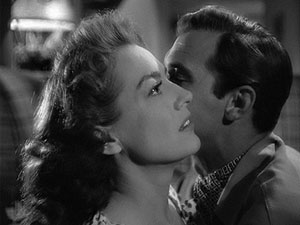
Perhaps it is this scenario which causes Mildred to feel eventual shame from the “hot, wanton excitement that Monty arouses in her” during the early years of their relationship, or perhaps it is just her reaction to society’s disapproval of female sexuality. Their relationship transforms into something like the trap in which Mildred tried to snare Wally years earlier, but with a twist. As Mildred’s financial situation improves, Monty’s declines drastically, to the point where she has to lend him money. Although turning the tables might render Mildred a liberated woman, if it’s still the kind of arrangement originally established by men; has feminism triumphed or is it a hollow victory?
Monty becomes, as he sullenly refers to himself, Mildred’s “paid gigolo.” Yet money, or the lack of it, does not alter his status as a “gentlemen,” particularly where Veda is concerned.
After Mildred divulges her arrangement with Monty to Veda, in an attempt to rid her of any romantic notions about Monty’s gentlemanly ways, the first flower of Veda’s evil begins to bloom. She fakes a pregnancy in order to blackmail young and wealthy Ted Forrester. Transferring this plot point into the film (but adding a quickie marriage) shows Veda for what she truly is, but can only go so far. While in both versions, Veda admits she wants the money to escape from her, the book goes further by having her point out the timing of her parents’ wedding and her own birth:
“If you mean why you got yourself knocked up, I suppose you did it for the same reason I did—the money . . . Of course, he has no money now, but at the time he was quite rich, and I’m sure you knew it. When the money was gone, you kicked him out.”
Only in the book do we realize that Mildred has created this monster, whether she knows or admits it. Earlier Mildred had felt disturbed yet seduced by Monty’s “loafing” lifestyle, calling it not a “weakness” but “a way of life. . . her mind rejected it, and yet her heart, somehow, was impressed by it . . . ”
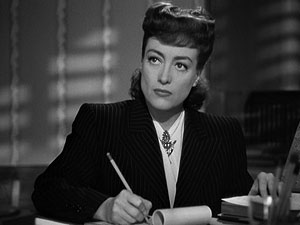
The movie, in avoiding the implications of premarital sex on Mildred’s part, then paints Veda as trash. After Mildred orders her to leave, Veda finds employment as a nightclub singer. Witnessing her precious Veda dressed in a midriff-baring top and suffering the catcalls of the questionable clientele, Mildred plots to buy Monty’s dilapidated Pasadena mansion and thus Veda’s love, after marrying Monty and his status, all of which she believes will keep Veda around.
The book, however, makes Mildred’s situation much more crushing: instead of a descent into sleaze, Veda becomes a revered opera singer, a coloratura soprano. Mildred may have money, and she may have used it to buy status, but she’ll never have talent, except at making pies. As usual, she is painfully unaware of this on a conscious level; not once does she connect this to Miss Turner’s previous indictment of her lack of skills. Veda views Mildred’s “woman’s work” as undignified labor.
By this time in the novel, nine years have passed since Mildred kicked Bert out. She is middle-aged, gaining weight, and losing the color in her face, while Veda is young and beautiful and has Mildred’s legs. Such concerns have always plagued women and continue to do so. Therefore, it doesn’t take much to suspect that Monty, at least, sees in Veda what he saw in Mildred years before. In both the novel and the film, Mildred catches them together, but only in the film is Veda punished. Monty refuses to marry her, calling her a “tramp.” Enraged, she kills him. Both Mildred and Bert confess to the crime, but the cops have already figured out that Veda is the killer. She is led away, while Mildred and Bert leave together.
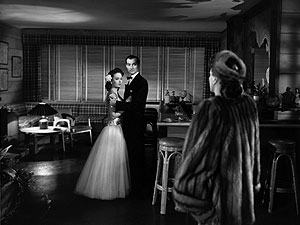
The novel finds Veda succeeding in perhaps her most evil scheme yet, one that could not have come to fruition without (again) Mildred’s unwitting assistance. After Mildred finds Veda with Monty, she tries to choke her to death, but manages only to destroy Veda’s golden voice. Or so we think. Veda takes advantage of her plight by weaseling out of one singing contract and into a higher paying one, and running off to New York with Monty. Mildred is left with nothing but Bert, having been bankrupted by her purchase of the Beragon estate and losing her businesses in the process.
Although it does raise important feminist issues without ever mentioning the F-word, not everyone may view Mildred Pierce as a feminist text. However, Mildred herself displays many of the traits that feminists admire: self-sufficiency, success on her own terms, and a share of sexual freedom. Still, deep down, Mildred aspires to be like Veda and it is that which eventually destroys her. We feel pity for her predicament, but also contempt for her slavish, practically incestuous devotion to Veda, whom she gave birth to in more than one way.
Veda then, is the id to Mildred’s ego, the Mr. Hyde to her Dr. Jekyll. Perhaps more pointedly, Veda is the monster to Mildred’s Frankenstein, a novel which, after all, was written by a woman who had lost a child. In exposing this duality, Mildred Pierce sheds light on the quandaries that have always faced feminists: not only a woman’s oppression by society, but also the oppression of woman by herself.
Todd Hayne’s five-part adaptation of Mildred Pierce premiered March 27 on HBO.
Time limit is exhausted. Please reload the CAPTCHA.